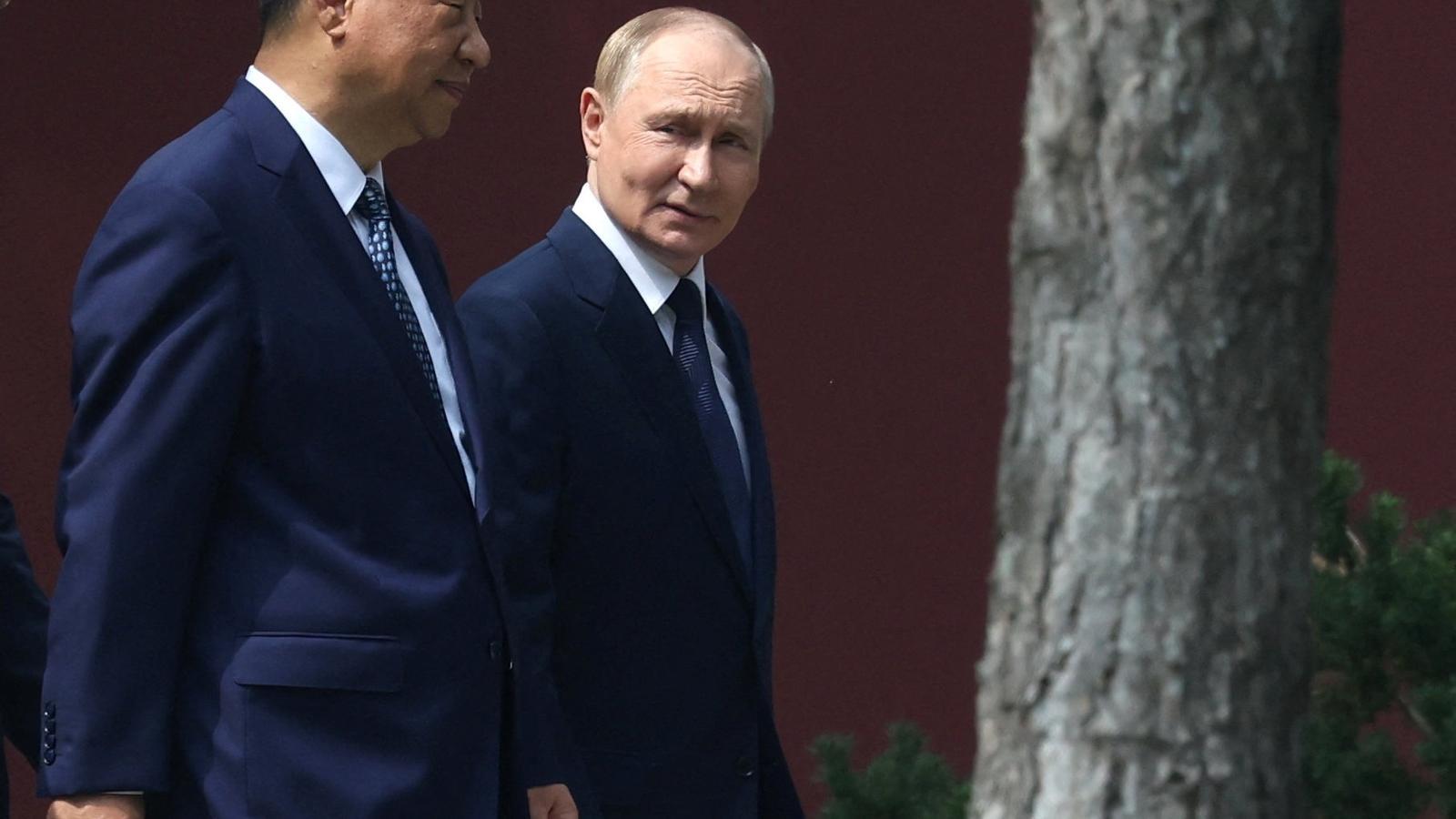Putin links Russia's economic future to China's power
Russian President Xi Jinping and his Russian counterparts signed a memorandum of understanding in Beijing for the construction of a new gas pipeline through Siberia and Mongolia.


BeijingXi Jinping and Vladimir Putin reaffirmed the strength of their alliance during their bilateral meeting in Beijing on Tuesday. Both leaders reached energy agreements and aimed to increase economic cooperation, but above all, they exchanged words of trust. Putin asserted that relations are at an "unprecedented level," and Xi declared his willingness to "strengthen exchanges." The signing of the memorandum for the construction of the Power of Siberia 2 gas pipeline marked a new strategic shift in relations between the two countries, which, in practice, represents a deepening of ties that had already been strengthened by Western sanctions on Moscow over the war in Ukraine.
In the Great Hall of the People, both presidents made an effort to display harmony before beginning the meeting. Xi greeted Putin with the title of "old friend," and the Chinese press described relations between the two countries as exemplary. The Chinese president emphasized that, in a changing international environment, both countries have managed to maintain "mutually beneficial cooperation," and even stated that he hopes to "promote further development of relations."
The kind words have translated into the signing of some twenty agreements. Russia will increase its gas supply to China through the Power of Siberia pipeline to 42 billion cubic meters per year. Coinciding with the interview, the Russian company Gazprom announced an agreement for the construction of the Power of Siberia 2 pipeline through Mongolia, with the capacity to supply 50 billion cubic meters of gas to China.
The project, long negotiated and stalled for years by price disputes, is an umbilical cord that links Moscow's economic future to Beijing and, in turn, underscores the deepening rift with the West. Since the invasion of Ukraine, China has become Russia's main trading partner. It is the largest buyer of Russian oil and gas and the second largest buyer of coal. EU sanctions have forced Moscow to focus on other markets such as China and India, with significant price cuts. Putin is seeking to replace part of the 230 billion cubic meters it previously sent to the European continent.
For its part, China has announced that it will allow Russian tourists to enter without visas, as it does with other countries.
The agreement was announced within the framework of the Russian head of state's long official visit to China. He arrived in Tianjin on Sunday to participate in the Shanghai Cooperation Organization summit. (SCO) closed on Monday and remains in China to attend Wednesday's military parade commemorating the 80th anniversary of Japan's surrender. Both leaders used the meeting to criticize the West: at the summit's closing ceremony, the organization rejected "interference in internal affairs" by third countries using the "pretext" of human rights, a policy shared by Beijing and Moscow.
In addition to meeting with Xi, Putin has used his stay to hold meetings with other leaders, such as Indian Prime Minister Narendra Modi; and the presidents of Iran, Turkey and Vietnam. This trip, which comes after the meeting with Donald Trump in Alaska, symbolizes Putin's return to the international scene and the end of his isolation.
Putin denies the possibility of an attack on the EU
Significantly for the EU, Putin also met with Slovak Prime Minister Robert Fico. He is the only EU leader who will be present at Wednesday's military parade commemorating the victory over Japan in 1945. Fico, who frequently clashes with Brussels, has always been close to Moscow. and has rejected the shipment of arms to Ukraine.
The Slovak prime minister, who is scheduled to meet with President Zelensky on Friday, asked Putin for a message for his European colleagues. At the beginning of the interview, Putin called a possible Russian attack on any European Union country "complete stupidity," an argument he had also used before the invasion, when he denied the possibility of a military attack in Ukraine.
The Russian leader praised Slovakia's "independent policy" and also asserted that he had never opposed Ukraine's entry into the European Union. Fico justifies his presence in Beijing because "a new international order" is being created. But the reality is that Slovakia is interested in continuing to buy Russian gas through TurkStream, contrary to the EU policy of trying to disassociate itself from Russian energy.
The meeting takes place as the Chinese capital is virtually sealed off ahead of the military parade to celebrate the 80th anniversary of Japan's surrender and the end of World War II in the Pacific. One of the last guests to arrive in Beijing was North Korean leader Kim Jong-un, who had not visited China since 2019. As is customary, Kim arrived this Tuesday surrounded by an aura of secrecy on his luxurious green armored train with a decoration dominated by gold. The train, which has about 90 carriages and consists of a sleeping area, meeting rooms and even an auditorium, has traveled 1,300 kilometers from Pyongyang.
Kim will have a prominent place in the parade, alongside Xi and Putin. It will be the first time that Kim attends an event with so many international leaders, leaving a symbolic image: that of the military alliance between countries with nuclear programs and weapons.
